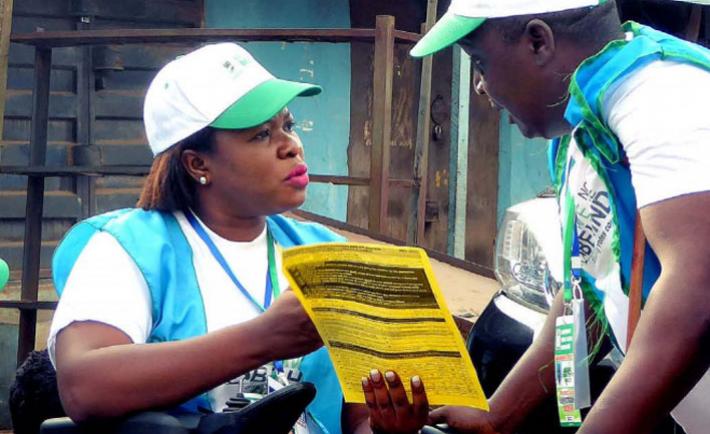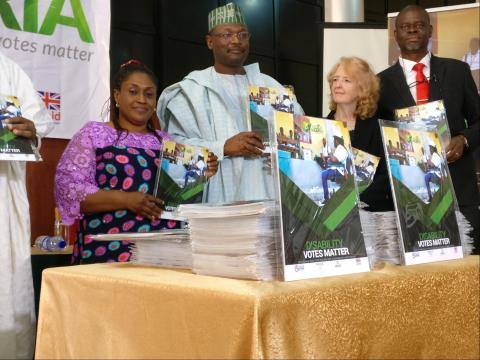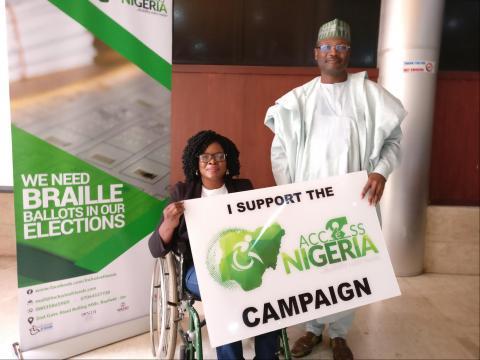
IFA's Grace Jerry (left) discusses the audit checklist with another Access Nigeria observer during an election day deployment.
In Nigeria, there is a dearth of reliable data on the number of people with disabilities, let alone the challenges they face participating in elections. In its World Report on Disability, the World Health Organization estimates that 15 percent of the world’s population lives with some form of disability. Based on this report, IFA approximates that there are 25 million Nigerians with disabilities.
For this reason, disability rights organization and NDI partner Inclusive Friends Association (IFA) audited polling unit accessibility during off-cycle gubernatorial elections in Edo (September 2016) and Ondo (November 2016) states, using a sample-based observation deployment methodology similar to parallel vote tabulation. The audits assessed the availability of handrails, ramps, braille or tactile ballots, written voting instructions and sign language interpreters. Armed with these newfound statistics, disability rights advocates such as IFA are now better equipped to make advocacy demands on decision makers to address barriers to the political participation for persons with disabilities in Nigeria.
On October 25, in front of key stakeholders including representatives of the Independent National Electoral Commission (INEC) and journalists, IFA presented its audit report, which contains findings about the specific barriers persons with disabilities encounter in the electoral process. The report is part of IFA’s broader Access Nigeria: Disability Votes Matter advocacy campaign, which aims to improve the participation of persons with disabilities in political and electoral processes through evidence-based advocacy, voter education and get-out-the-vote mobilization efforts.
The accessibility audits, the first-ever led by people with disabilities in Nigeria, revealed widespread barriers. Most polling units were located in inaccessible places, and none provided braille or tactile ballots for voters who are blind or have low vision. At almost half of polling units in Edo, the placement of ballot boxes barred persons with disabilities from independently casting their ballots; this problem was even more acute in Ondo, where persons with disabilities were unable to vote independently in 77 percent of polling units. Finally, observers’ reports found that Form EC 40H, with which INEC records the participation of persons with disabilities on Election Day, was not used at 45 percent of the polling units observed in Edo and 70 percent of those observed in Ondo.
At the presentation of its audit report last month, IFA also unveiled a new Access Nigeria campaign video to help illustrate the experience of persons with disabilities on election day. Key recommendations highlighted during the event include:
- the need for locating polling units on flat surfaces,
- utilizing the Form EC 40H consistently to disaggregate by type of disability,
- consulting with persons with disabilities in the design and implementation of voter education and electoral procedure policymaking and training,
- budgeting for written instructions for voters who are deaf or have hearing loss, and
- introducing braille or tactile ballots.
In response, INEC chair, Professor Mahmood Yakubu, stated that the Commission “recognizes the rights of persons with disabilities as fundamental to [Nigeria’s] democracy.” He also detailed some of the recent efforts to make elections more accessible, including the establishment of disability desks at commission offices and disability-specific provisions in its 2017-2021 strategic plan.
Despite these advancements, Chairman Yakubu acknowledged the substantial challenges that continue to disenfranchise voters with disabilities in Nigeria. He assured that INEC would look into the audit report and leverage his role as chair of the Economic Community of West African States (ECOWAS) Network of Electoral Commissions (ECONEC), to share IFA’s audit recommendations and findings with other election management bodies in the subregion. Moreover, he approved INEC personnel’s participation in IFA’s quarterly stakeholder forums on inclusive elections, slated to begin next year. On Twitter, INEC affirmed its commitment by tweeting photos of Chairman Yakubu lending his support to the campaign.
Prof. Mahmood today assured Persons With Disabilities of the Commission's commitment to their full participation in the electoral process. pic.twitter.com/hSmr9PApwl
— INEC Nigeria (@inecnigeria) October 25, 2017
While INEC has made notable strides in bettering access to electoral processes for voters with disabilities, IFA recognizes that more needs to be done to turn these commitments into action on the part of INEC and other key stakeholders, to strengthen and safeguard disability rights. With NDI’s support, IFA will continue to advocate for persons with disabilities in Nigeria through sustained pressure on INEC and disability-centric voter education efforts.
Additionally, IFA is exploring partnerships with budget monitoring organizations that could provide valuable data on INEC’s budget and expenditures. IFA plans to use this data to put pressure on INEC to invest in administrative reforms that would improve voting polling unit access for persons with disabilities. IFA is also assessing possibilities for legal reform that it could advocate for to the National Assembly and ministries that have purview over electoral issues. IFA is also considering conducting a third audit in another state gubernatorial election in 2018 to evaluate improvements to the accessibility of polling units, which would inform IFA’s advocacy strategy in the lead up to the 2019 national polls.
Editor's Note: The Access Nigeria: Disability Vote Matter campaign is supported by the United States Agency for International Development (USAID) and the United Kingdom Department for International Development (DFID).




